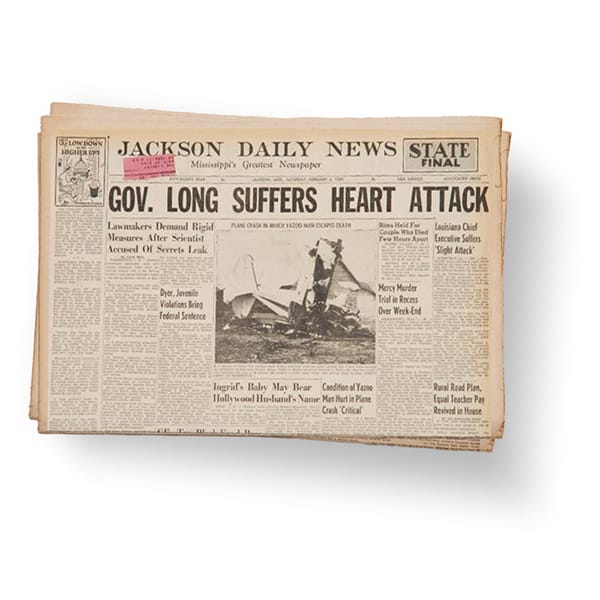1940 Newspaper Headlines
What were the most significant events in 1940 that took over our national newspaper headlines? 1940 news headlines are filled with stories of war and destruction as Europe was in the grips of the most deadly and destructive war that the world has ever seen: World War II.
It was during this year that Germany invaded Denmark, Norway, France, Luxembourg, Belgium, and the Netherlands. It was also the year Germany began its terrible bombing crusade over London in what would become known as The Blitz, as they attempted to weaken the British Air Force. Roosevelt was elected for a third term of presidency and Walt Disney’s second feature length film “Pinocchio” premiered in New York City. Find out more about this exciting year in history with an original newspaper which was printed at the time.
January 8, 1940
Food rationing begins in Great Britain as a result of the Second World War.
March 18, 1940
Adolf Hitler and Benito Mussolini meet at Brenner Pass in the Alps and agree to form an alliance against France and the United Kingdom.
April 7, 1940
Booker T. Washington – an educator, author and leading figure in African-American communities – becomes the first black man to be depicted on an American postage stamp.
May 10, 1940
Neville Chamberlain resigns as Prime Minster and Winston Churchill replaces him.
June 4, 1940
British forces successfully complete the evacuation of 300,000 troops from Dunkirk in France.
June 4, 1940
Winston Churchill tells the British House of Commons, “We shall not flag or fail. We shall fight on the beaches… on the landing grounds… in the fields and the streets… We shall never surrender.”
June 10, 1940
Italy declares war on France and the United Kingdom.
June 14, 1940
Paris falls under German occupation.
July 10, 1940
The Battle of Britain begins. The German Air Force attempt to gain air superiority, but the Royal Air Force stand firm. This is the Nazi Germans’ first defeat in the Second World War and thus regarded as a turning point of the war.
August 20, 1940
Winston Churchill pays tribute to the Royal Air Force in the House of Commons: “Never in the field of human conflict was so much owed by so many to so few.”
September 7, 1940
Nazi Germany begins to rain bombs on London in the first of fifty-seven consecutive nights of strategic bombing, known as the Blitz.
November 9, 1940
Neville Chamberlain, former Prime Minister of the United Kingdom (b. 1869) dies.
November 11, 1940
Battle of Taranto: The Royal Navy launches the first all-aircraft carrier strike in history, on the Italian fleet at Taranto.
November 14, 1940
Coventry is destroyed by five-hundred German Air Force bombers using a total of 150,000 fire bombs, 503 tons of high explosives, and 130 parachute mines. 568 people are killed.
December 12, 1940
The City of Sheffield is badly damaged by German air-raids.
December 21, 1940
F. Scott Fitzgerald, American writer (b. 1896) dies from a second heart-attack.
December 29, 1940
The second Great Fire of London: The Luftwaffe carry out a massive incendiary bombing raid, starting 1,500 fires. Many famous buildings, including the Guildhall and Trinity House, are either damaged or destroyed.
More from this Decade

